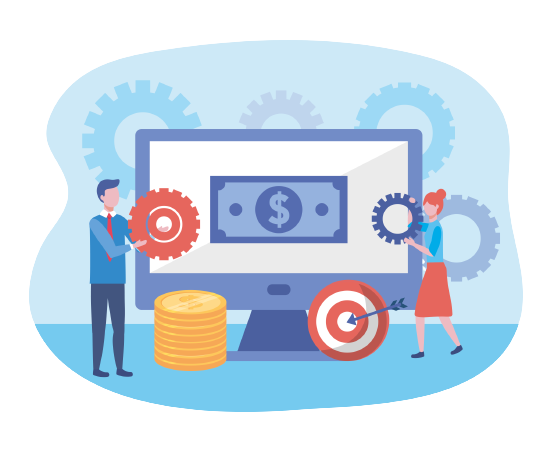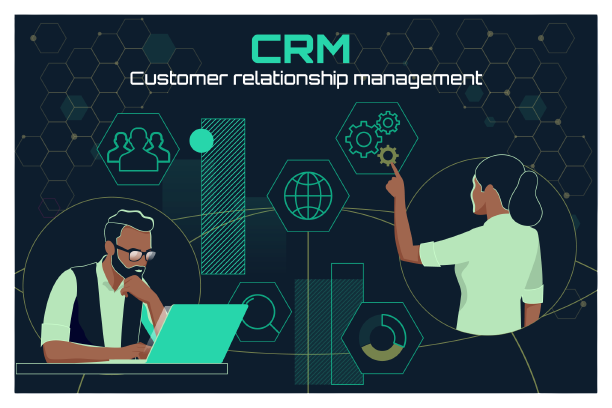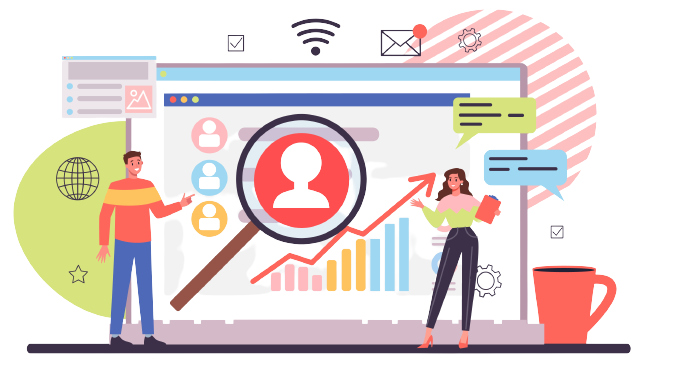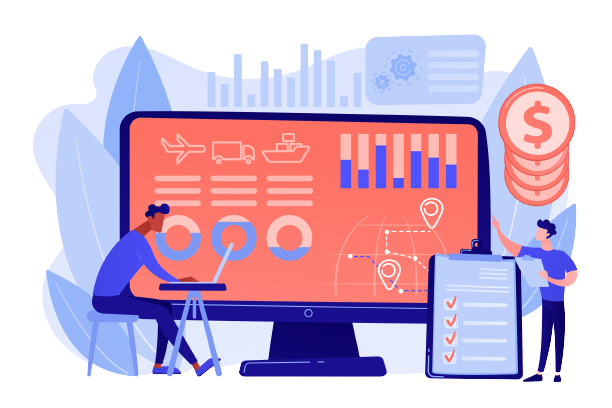
According to a report by Grand View Research, the global CRM market size was valued at over $40 billion in 2020 and is expected to reach over $113 billion by 2028, indicating the widespread adoption and growing significance of CRM software. This underscores the importance of numerous CRM solution providers to render their products cost-effective and conducive to business needs. Such an approach becomes crucial in facilitating the widespread adoption of c in the years to come.
In this blog, we’re going to explore how using a cost effective CRM for small business can really help small businesses. We’ll learn about all the good things it brings, like the benefits it offers and the special advantage it gives to stand out from the competition. We’ll start by understanding the basics and then look at stories from the real world where it made businesses successful. So, get ready to discover how CRM can make a big difference for small businesses!
What is CRM and Why Do Small Businesses Need It?

At its core, CRM is a strategic approach that empowers businesses to build and nurture strong customer relationships while streamlining internal processes. For small businesses, CRM offers a centralized platform to manage customer data, interactions, and communication. It acts as a digital hub where businesses can store essential customer information, including contact details, purchase history, preferences, and more. This information becomes a valuable asset for tailoring personalized experiences, anticipating customer needs, and delivering exceptional service.
But why do small businesses need CRM? The answer lies in the competitive advantage it provides. With cost effective CRM for small business, small enterprises can:
- Enhance Customer Experience: CRM enables businesses to understand their customers better. By analyzing past interactions, preferences, and behaviors, small businesses can provide personalized solutions, leading to improved customer satisfaction and loyalty.
- Increase Efficiency: Manual data entry and scattered information can hinder productivity. Cost effective CRM for small business streamlines tasks by automating processes, reducing administrative burdens, and allowing teams to focus on high-value activities.
- Optimize Marketing Efforts: Targeted marketing campaigns are more effective. CRM systems help small businesses segment their customer base, enabling them to create tailored marketing strategies that resonate with specific customer groups.
- Boost Sales: CRM provides insights into customer buying behaviors, enabling sales teams to identify cross-selling and upselling opportunities. This can lead to increased sales and revenue.
- Improve Collaboration: With a centralized database accessible to various teams, collaboration becomes seamless. Marketing, sales, and customer service departments can work together to ensure a consistent customer experience.
- Data-Driven Decision Making: The wealth of customer data within CRM systems empowers small businesses to make informed decisions. Analyzing trends and patterns can guide strategic choices and future planning.
Explore the world of cost effective CRM for small business and unlock a world of possibilities for your business. Let’s get started on your journey to success!
How CRM Systems Drive Success for Small Enterprises?

Small businesses often face resource constraints, making efficient use of available assets crucial. CRM systems act as force multipliers, enabling small enterprises to accomplish more with less. By centralizing customer data and interactions, CRM facilitates targeted marketing, personalized customer service, and streamlined operations.
One of the key drivers of growth through CRM is lead management. Small businesses can efficiently capture and nurture leads, ensuring that potential customers don’t fall through the cracks. Automation tools in cost effective CRM for small business can send follow-up emails, schedule appointments, and trigger alerts when specific actions are taken, ensuring timely and relevant interactions.
Moreover, CRM systems offer robust reporting and analytics capabilities. Small business owners can track key performance indicators (KPIs) such as customer acquisition cost, customer lifetime value, and conversion rates. These insights guide strategic decisions, helping businesses allocate resources effectively and pursue growth opportunities.
Why Cost-Effective CRM is a Game Changer for Small Businesses?

A cost effective CRM for small business brings the power of CRM within reach for small businesses with limited budgets. While traditional CRM implementations might have been cost-prohibitive, advancements in technology have made it possible to access feature-rich CRM systems without breaking the bank.
The benefits of cost effective CRM for small business include:
- Affordability: Small businesses can access essential CRM features at a fraction of the cost of traditional solutions, allowing them to allocate resources to other critical areas.
- Scalability: Many cost-effective CRM solutions offer scalable plans, accommodating business growth without significant financial strain.
- Ease of Implementation: Cloud-based CRM systems are easy to set up and require minimal IT infrastructure, reducing implementation time and costs.
- User-Friendly Interfaces: Most cost-effective CRM platforms offer intuitive interfaces that require minimal training, ensuring rapid adoption across the organization.
- Integration: These systems often integrate with other essential tools like email marketing platforms, e-commerce systems, and analytics tools, providing a holistic view of business operations.
Transforming Small Business Operations with CRM

The shift towards customer-centric business models has reshaped how small businesses operate. Customer expectations have evolved, demanding personalized experiences and meaningful interactions. Cost effective CRM for small business serves as the linchpin of this revolution, enabling small enterprises to put their customers at the center of everything they do.
CRM helps small businesses:
- Create Personalized Experiences: By tracking customer preferences and behavior, businesses can tailor their offerings and communication to match individual needs.
- Build Lasting Relationships: CRM facilitates ongoing communication, helping businesses engage with customers beyond transactional interactions.
- Anticipate Needs: Analyzing past interactions allows businesses to predict future needs, enabling proactive service and support.
- Foster Loyalty: Satisfied customers are more likely to become loyal brand advocates. CRM helps identify and reward loyal customers, strengthening brand loyalty.
- Drive Continuous Improvement: Feedback and data collected through CRM systems empower businesses to continuously refine their offerings and processes.
Thus, cost effective CRM for small business holds immense potential for small businesses. Whether through cost-effective solutions or customer-centric strategies, embracing CRM can set small enterprises on a trajectory of success in the modern business landscape.
How to Choose the Best Cost-Effective CRM for Your Small Business?

Selecting the right CRM system is a critical decision for small businesses looking to optimize customer interactions, streamline operations, and drive growth. With a wide range of options available, finding the best cost effective CRM for small business requires careful consideration and strategic planning. Let’s walk you through the essential steps to ensure you make an informed choice that aligns with your business goals and budget.
1. Define Your Business Needs and Goals:
Before diving into the world of CRM solutions, take the time to clearly define your business needs and objectives. Consider the following questions:
- What specific challenges are you facing in managing customer relationships?
- What processes do you want the CRM to improve or automate?
- What are your growth goals, and how does the CRM fit into achieving them?
- What are your priorities: sales, marketing, customer support, or a combination?
Budget is a crucial factor when choosing a cost effective CRM for small business. Determine how much you’re willing to invest in a CRM system, considering both upfront costs and ongoing subscription fees. Remember that the value the CRM brings to your business should outweigh the cost.
3. Identify Must-Have Features:
Different CRM solutions offer varying sets of features. Make a list of features that are essential for your business. These might include:
- Contact and lead management
- Sales pipeline tracking
- Email integration
- Reporting and analytics
- Workflow automation
- Customization options
A user-friendly interface is essential for successful CRM adoption. Look for a system that’s intuitive and easy to navigate. Complex systems might require extensive training, which could impact productivity.
Think about your business’s growth trajectory. Will the cost effective CRM for small business scale with your needs as your customer base and operations expand? Avoid outgrowing your CRM too quickly by choosing one that can accommodate your future needs.
Your CRM should seamlessly integrate with other tools you use, such as email marketing platforms, e-commerce systems, and accounting software. This integration streamlines processes and prevents data silos.
7. Data Security and Compliance:
Ensure the CRM adheres to robust data security standards and compliance regulations, especially if your business deals with sensitive customer information.
8. Read Reviews and Seek Recommendations:
Research CRM options by reading reviews, seeking recommendations from peers, and considering case studies of businesses similar to yours. This can provide valuable insights into how different cost effective CRM for small business perform in real-world scenarios.
Most CRM providers offer demos and trial periods. Take advantage of these opportunities to get hands-on experience with the system and assess whether it meets your requirements.
10. Total Cost of Ownership (TCO):
Consider not only the upfront costs but also the total cost of ownership over time, including subscription fees, customization costs, training expenses, and potential integrations.
11. Scalability and Flexibility:
Choose a CRM solution that can grow and evolve with your business. Avoid getting locked into a system that can’t adapt to changes in your business environment.
Involve your team in the decision-making process. Their input is invaluable since they’ll be the ones using the CRM on a daily basis.
By following these steps and carefully evaluating your options, you can choose the best cost effective CRM for small business that aligns with your small business’s unique needs, helping you build stronger customer relationships and drive overall success.
Avoiding Common Pitfalls: Mistakes to Steer Clear of When Adopting a CRM System

Implementing CRM software can be a transformative step for small businesses, enhancing customer interactions, optimizing processes, and fostering growth. However, like any major change, there are potential pitfalls that you should be aware of and proactively avoid. Let’s discuss some common mistakes businesses make when adopting a cost effective CRM for small business and provide strategies to steer clear of them.
1. Neglecting Clear Goals and Objectives:
Mistake: Adopting a CRM without a clear understanding of how it aligns with your business goals can lead to unfocused implementation and underutilization.
Solution: Define your objectives before selecting a CRM. Determine what specific problems you aim to solve and how the CRM will contribute to achieving your goals.
2. Overlooking User Adoption:
Mistake: Focusing solely on the technology and neglecting the users can result in low adoption rates and resistance from your team.
Solution: Involve your team early in the selection process. Choose a cost effective CRM for small business that’s intuitive, provides thorough training, and communicates the benefits to encourage buy-in.
3. Ignoring Data Quality:
Mistake: Migrating inaccurate or incomplete data to your new CRM can lead to errors, inefficiencies, and a compromised customer experience.
Solution: Cleanse and organize your data before migration. Take the time to ensure accuracy and completeness to start off on the right foot.
4. Not Customizing for Your Business:
Mistake: Assuming a one-size-fits-all approach can lead to using only a fraction of the CRM’s potential and missing out on tailored benefits.
Solution: Customize the CRM to align with your unique processes and needs. Utilize features that will genuinely improve your workflows.
5. Failing to Train Properly:
Mistake: Insufficient training can result in frustration and hinder users from utilizing the CRM effectively.
Solution: Provide comprehensive training sessions for all users, covering basic functions and advanced features. Offer ongoing support to address questions and concerns.
6. Disregarding Integration:
Mistake: A lack of integration with existing tools can lead to duplication of efforts and fragmented data.
Solution: Choose a cost effective CRM for small business with strong integration capabilities. Ensure it can connect seamlessly with your other business tools to create a unified ecosystem.
7. Underestimating Maintenance Needs:
Mistake: Assuming that the CRM implementation is a one-time task can result in neglecting necessary updates and improvements.
Solution: Allocate resources for regular maintenance and updates. Stay current with software versions and continuously optimize your CRM for your changing business needs.
8. Neglecting Change Management:
Mistake: Failing to manage the organizational change that comes with CRM implementation can result in resistance and a lack of alignment.
Solution: Develop a change management strategy that involves communication, training, and addressing concerns. Emphasize the benefits and support the transition.
9. Not Measuring ROI:
Mistake: Not tracking the impact of the CRM on your business can leave you unaware of its true value.
Solution: Establish Key Performance Indicators (KPIs) to measure the CRM’s impact. Regularly analyze the data to understand the ROI and make necessary adjustments.
10. Skipping Data Security and Compliance:
Mistake: Neglecting data security and compliance can lead to breaches, legal issues, and damaged customer trust.
Solution: Choose a cost effective CRM for small business with robust security features and ensure it complies with relevant data protection regulations.
11. Rushing Implementation:
Mistake: Hasty implementation can result in mistakes, incomplete setup, and overlooked customization opportunities.
Solution: Plan and execute the implementation methodically. Thoroughly test the system before going live to catch any issues beforehand.
By being aware of these common pitfalls and actively addressing them, your small business can smoothly navigate the CRM adoption process, maximize the benefits of the system, and build stronger customer relationships while driving growth.
Wrapping Up!
Several savvy entrepreneurs have discovered CRM for small business as a powerful ally in their pursuit of success. These entrepreneurs recognize that CRM is more than just a software solution—it’s a strategic tool that empowers them to outperform competitors in a variety of ways. That’s why they are leveraging CRM to gain a competitive edge that extends beyond traditional methods.
In the race to outperform competitors, entrepreneurs have discovered that CRM isn’t just a tool—it’s a game-changer that empowers them to forge stronger customer relationships, optimize operations, and make data-backed decisions. By personalizing interactions, streamlining processes, and leveraging predictive insights, these entrepreneurs are not only staying competitive but also reshaping the landscape of their industries.
As you start your own journey of entrepreneurial success, just remember that cost effective CRM for small business isn’t a mere trend; it’s a strategic investment that has the potential to elevate your business to new heights. By embracing CRM’s capabilities and integrating them into your business strategy, you’re setting the stage for a future where you’re not just competing but leading the pack in innovation, customer satisfaction, and sustainable growth.